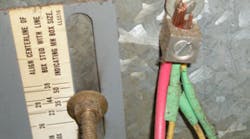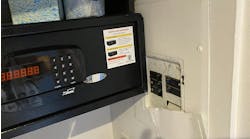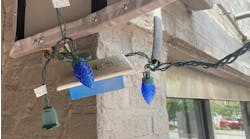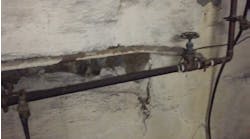As usual, never consider the following commentary associated with these photos as a formal interpretation of the National Electrical Code (NEC). Without criticizing anyone or any product, the following scenarios present us with serious safety questions.
All references are based on the 2008 NEC.
FILL 'ER UP
Jamie Conrad, a foreman/journeyman electrician with RJ Skelding Co., Inc., in Allentown, Pa., ran across this mess at a hotel. “The only wire feeding into the panel that is right is the one I added with an MC connector,” says Conrad. “The rest of the wires enter Romex connectors. Also, you can see they used a piece of broken plumbing pipe to run the feed and some branch circuits from a panel next to this panel.”
From the looks of this installation, it was never inspected. Aside from the improper use of fittings not designed for the wiring methods used here (300.15), we should also be reminded that plumbing materials do not comply with wiring method requirements in 110.8. Only wiring methods recognized as suitable are included in the NEC.
NO STANDING ZONE
Robert Lengfelder, senior program manager, RGLA Solutions, Inc., Schiller Park, Ill., ran across this 122.5kVA transformer at a job site. “After I commented, ‘I don't think that's safe,’ they reinforced the Unistrut to be supported from the other two bar joists as well,” says Lengfelder. “Notice how the Unistrut is bending. The transformer weighs approximately 800 pounds!”
Qualified persons and installers are trained to provide supporting methods that will be strong enough to hold the weight of the equipment. Obviously, these installers used no common sense here. The location of the equipment may comply with 450.13, but all bets are off until the metal framing supports are redesigned.
As per 450.13, “All transformers and transformer vaults shall be readily accessible to qualified personnel for inspection and maintenance or shall meet the requirements of 450.13(A) or 450.13(B).”
Found a Code violation? E-mail your photos (no cell phone images, please) to [email protected], and we'll try and publish them in a future issue.






